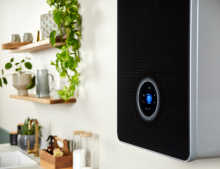Green and efficient heating systems
For environmentally-friendly homes looking to keep energy bills down.
They work by taking energy from outside and transferring it into heat to be circulated around the heating and hot water system. As well as providing heat through radiators and underfloor heating, they can also heat water stored in a hot water cylinder for your home’s hot water supply.
What is an air to water heat pump?
An air to water heat pump system collects ambient thermal energy in the environment and, through a 4-stage process, transfers it into usable heat for the home:
- Warmth is absorbed from the outdoors, via a fan in the external unit, outside your home
- The warmth of the air is transferred into a refrigerant circuit and compressed to a high temperature
- The now hot refrigerant is transferred into water via a heat exchanger
- Hot water is circulated around your system, to heat radiators and underfloor heating as well as hot taps, showers and baths


Getting your heat pump installed
Getting an air to water heat pump boiler is a relatively simple and straightforward process, which requires little outdoor space and uses the same controls and pipework as a boiler.
The process involves installing an external fan unit to the outside of your home, either on the ground or mounted to a wall. This will gather the warmth from outside air. A corresponding indoor unit is installed inside the home, which is needed to transfer the compressed refrigerant into heat throughout your heating system and hot water taps.
Hot water solution
Air to water heat pumps utilise natural energy to provide your home’s hot water supply.
Highly efficient
The heat produced is significantly greater than the electricity used to run it.
Environmentally friendly
Air to water heat pumps require no gas, oil, or fuel to run – using natural thermal energy.
Frequently asked questions
Find a local installer
Each heating system needs custom designing. Find and contact a Worcester Accredited Installer in your area to book a home visit.
After calculating the best system for your home and hot water requirements, your installer will then provide you with a free quote.





